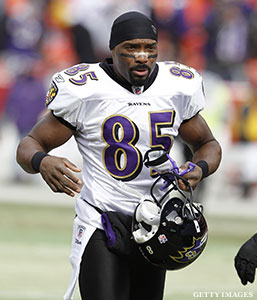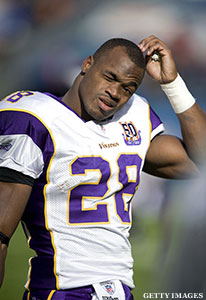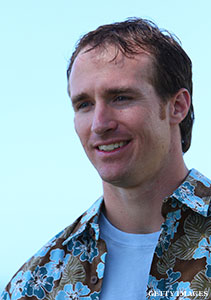Dear Players:
I hope this finds you well. Like you, I hope this dispute is resolved in a timely manner and that the damage is temporary and minimal. That said, you could go a long way towards ensuring that's the case.
I know in recent weeks some of you have gone public with your thoughts on the current state of things. For the most part, this has gone well and I applaud your efforts.

I especially commend those of you who have tried to soothe the fans' angst by admitting that the specter of rich people fighting wealthy people over money is just absurd. "It's never a good look for the fans to have the players and the owners arguing over money," Jonathan Vilma said, "and so hopefully we can get it worked out as soon as possible and get back playing." Vilma is absolutely right in his approach. Keep the focus on the fans. Tell them you're well aware of the fact you make a living playing a game and that, in any context, this dispute is nothing short of offensive.
But you should also know that this won't always ease the fans' pain. See, a lot of folks are bitter, angry and disillusioned. They're out of work and being forced to make painful lifestyle changes at a time when they should be enjoying the fruits of a lifetime of labor. These people don't want to hear anything about the "business of the game." As far as they're concerned, there is no business. They don't go to games because they can't afford tickets. Their experience comes through the screen. For them, 'ball is escapism, nothing more. So keep it positive, but at this point don't expect to change anyone's mind.
Derrick Mason's recent statement, in which he called Roger Goddell a "joke," is an example of what not to do. In one sense, it's bold and daring and frightfully candid. In Mason's case, it's not a totally bad idea. For him the risk is minimal because, at 36 years old, Mason is at the end of his career. So he can afford to exit in a blaze of controversial glory.
Athletes who make audacious statements in regards to the league are often praised for their so-called "objectivity" and rewarded with plum media opportunities. But I would advise against doing what Mason did. The commissioner isn't a former teammate, coach or some expendable player; he's part of a more broad and unforgiving framework of power. So any attacks on him will be seen as an attack on all executives. Like I said, right now, it's better to focus your energy on the fans' concerns.
And that reminds me: I suppose this should be aimed at black guys in particular, but all references to slavery should be avoided altogether. While I appreciate Adrian Peterson's efforts to discuss the complicated nuances of labor practices, he has to find a better way to reach his audience.

While some of us understand that Peterson referenced slavery in terms of one entity having all the power and another entity having none, there is the reality that such provocative references will be taken quite literally. To successfully traverse a treacherous landscape, you have to know where the mines are. In this case, the racial ingredient is the most explosive one of all.
The average professional football fan is white, middle-aged and male. And you have to remember that his social experience is probably nothing like yours. That's why references to slavery—regardless of intent, just won't wash with this crowd.
See, we're in this peculiar age of revisionist history. Right now, the Texas Board of Education is rewriting history textbooks to remove the term "slave trade" from the fifteenth century export/import business. Rather than bring undue attention to the once popular and lucrative trafficking of Africans, these folks think it would be more efficient to lump human cargo in with the other "goods," like cotton and rum. That way the trading of dark flesh becomes just another component of what they propose to call the "Atlantic Triangular Trade." Just sounds better, I guess.
This kind of re-branding caters to the sensibilities of the average white guy whose reaction to topics that even tenuously pertain to race, is almost visceral.
He’s not necessarily a bad guy, or even a racist. But like I said, his experience is nothing like yours. For all the years you’ve played organized sports, you’ve not only interacted with guys of different races, you’ve done so in the most intense settings. White men have been among your trusted teammates and companions. Some of you black guys may even count white guys as some of your best and most loyal friends. Sport breeds that sort of comfort with difference. You learn to trust white guys and they learn to trust you. Not all guys can relate to that kind of relationship. As a result, the mere mention of "black," "white," or "race," makes them uncomfortable.
Finally, when discussing the current state of this game, it’s okay to incorporate the past. Just do so thoughtfully. By now you've heard that Drew Brees got into trouble when he took a stance against all the former players who are fighting for better benefits. Apparently, Brees attributed the old timers' struggles to "bad business decisions."
A guy named Sam Huff, one of the more colorful characters to ever play the game, took exception to this. While there may be some truth to what Brees said, there's some economic reality at play here. In 1969, Sam Huff's final year, the average salary was about $19,000. Unless a man had the clairvoyant ability to bet it all on some can't-miss investment opportunity, there was nothing that could make him insanely wealthy.

Perhaps this is why Sam Huff initially took umbrage to Brees' statement and why he still seems pretty annoyed. But I think there’s more to consider than money and benefits. I met Sam Huff during my days as a Washington Redskin. Huff and former Skins quarterback Sonny Jurgensen did a weekly radio show and after the games, both men would come down to the field and greet the players as we made our way to the dressing room. Regardless of the day's outcome, both Huff and Jurgensen just seemed grateful to be there, to be around the game, in the vicinity of a product they obviously loved.
That first time I shook his hand after a game, Huff had a big, beaming smile and light shone in his eyes. "We have to get you on the show one of these days," he said. At that moment he didn't remind me so much of a decorated football player as he did a proud old man. He exuded a pride that didn't so much come from being a Hall of Famer, as it did from being one who lived to tell the story. As I get older, I'm beginning to see there's a certain peace and a certain joy that comes from…well, surviving.
So when you guys address the past, don't think of the men who came before you as former football players. Think of them as you would the older members of your family -- the uncles, cousins, and grandfathers who know that, in some ways, perspective is more valuable than money.
And speaking of perspective, take this for what it's worth: I personally think an 18 game season is a good thing, especially if it means cutting training camp by two weeks. Sure, you won't make any more money for those two extra games. But those of us who spent every minute of every training camp just fighting for a roster spot usually needed the whole month of September just to recover from the experience.
I think anything is better than training camp. But maybe that’s just me.
Take care, fellas.
Peace,
Alan Grant




